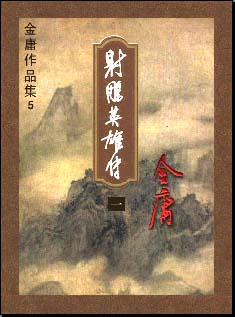31 October 2011
Vengeance, forgiveness, love, patriotism and care for the common people
Last night I finished the fan translation of Eagle-Shooting Hero 《射鵰英雄傳》 by Sir Louis Cha (better known by his nom de plume Jin Yong 金庸, taken from the character elements of his given name 查良鏞), also on a recommendation from my significant other.
What a ride.
Never mind that the whole thing is only marginally shorter than War and Peace, and that I’ve been reading it on-and-off since July; this book is amazing, even in translation (however rough it may be). The elderly Hong Kong master of letters has a reputation both in China and among the overseas Chinese community that is apparently fully deserved. Not only is this an admirable work of historical fiction in its own right (taking place during the conquest of China by Jingghis Khan, and incorporating historical figures such as the great Khan and his Daoist advisor Qiu Chuji seamlessly with his fictional characters); it tackles philosophical and moral questions as well as an Edith Pargeter novel can.
The primary story follows two sons of renowned Song heroes: Guo Jing 郭靖, son of Guo Xiaotian, and Yang Kang 楊康, son of Yang Tiexin – named by Qiu Chuji after the Humiliation of Jingkang 靖康之恥 when Jurchen soldiers from the bordering kingdom of Jin looted and razed Kaifeng, and kidnapped the Song Emperor and his relatives. The two boys, though their fathers are close friends from the same village, grow up separately from each other and lead very different lives: Guo Jing is raised by his mother and by his martial-arts masters on the Mongolian steppe, whilst Yang Kang is adopted by a Prince of Jin, and changes his surname to Wanyan 完顏. Whilst Guo Jing is crude, unlettered, stubborn and slow-witted, and learns things only through sheer repetition and force of will, Yang Kang is erudite and clever. More importantly, though, Guo Jing, being raised by his mother and by six martial artists of lower-class upbringing (the Six Freaks of Jiangnan), is honest to a fault and brave bordering on foolhardy. Yang Kang, though, with his court upbringing, becomes something of a pathological liar.
Guo Jing is introduced to the world of ‘rivers and lakes’ (the martial-arts world) by his teachers, and sent on a quest by his mother to avenge the death of his father at the hands of the Jin. On this quest he not only has repeated run-ins with his sworn brother Yang Kang, but also meets his star-crossed lover Huang Rong, the overpoweringly-intelligent daughter of one of the most powerful (and cruel) martial artists in the world.
I won’t give away too much of the story here; suffice it to say that this epic explores a number of ethical questions in detail – and in ways which are surprising. Though the book as a whole upholds the virtues of filial piety and loyalty to one’s country, the reader is sometimes left to cheer when Guo Jing is aided by someone acting against the wishes of a parent or of a king – only to be left scratching his head (as Guo Jing eventually does) at the contradiction. Though Guo Jing himself is presented as the Confucian paragon and the ethical centre of the story’s universe (in a rather ironic way, given how he is also presented as half-barbarian on account of his Mongolian upbringing), Huang Rong is a much more accessible character, whose conscience is more readily conflicted by the tension between filiality, upright behaviour and her practically all-consuming love for Guo Jing.
War itself is an ever-present force which is often brought to the foreground – the Jin attack on Ox Village (separating Guo Jing from Yang Kang) and the bloody Mongolian conquests of Jin and the (supposedly Jin-aligned) eastern Iranian kingdom of Horezm bookend the novel. The suffering of common people in war, and at the hands of military leaders and bandits, is likewise emphasised, as is the duty (ever-present in wuxia novels of this kind) of the world of rivers and lakes to come to the defence and aid of the innocent.
Even across the combined language and cultural gaps of the translator and the reader, the book lost none of its emotional potency or its ability to engage. The demands of honour and virtue, pitted against the personal desires of the protagonists, were so well-balanced that one had to feel empathy for Guo Jing even as his sense of honour led him to repeatedly thwart his own and Huang Rong’s desire for a peaceful life together. Sir Louis Cha manages quite adroitly to keep his characters sympathetic without turning them into saints or martyrs… the one possible exception being Hong Qigong, one of the five best martial artists in the world, and the leader of the Beggar Clan.
It is certain, once my workload becomes a little more manageable, that I’ll pick up the two sequels in the trilogy: Divine Eagle, Gallant Knights 《神鵰俠侶》 and Heaven-Reliant and Dragon-Slayer 《倚天屠龍記》 (which are equal in length). But I have a sneaking suspicion that Eagle-Shooting Hero will continue to be my favourite in the trilogy.
Labels:
Anglophilia,
books,
Confucianism,
Eranshahr,
history,
Huaxia,
nerdiness
Subscribe to:
Post Comments (Atom)













No comments:
Post a Comment